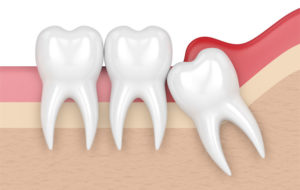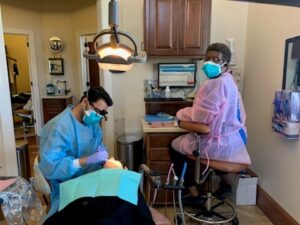Wisdom teeth are the last set of molars that usually appear in your late teens or early twenties. Sometimes, these teeth don’t have enough room to grow in properly, becoming what’s known as “impacted.” If you’re wondering whether an impacted wisdom tooth must be removed, the answer depends on your individual situation. This article explores what happens if impacted wisdom teeth are left untreated, whether they need to be removed immediately, and how serious they can be.
What Happens If an Impacted Wisdom Tooth Is Not Removed?

An impacted wisdom tooth is stuck under the gum or partially erupts because there isn’t enough space in your jaw. Leaving it untreated can lead to several problems.
Potential Complications of Untreated Impacted Wisdom Teeth:
- Infections:
- Partially erupted wisdom teeth can trap food and bacteria, causing gum infections like pericoronitis.
- If the infection spreads, it can affect surrounding tissues and even your jawbone.
- Tooth Decay:
- Impacted wisdom teeth are hard to clean properly, making them more prone to cavities.
- Decay can also spread to neighboring teeth.
- Cysts and Tumors:
- Fluid-filled cysts can form around impacted teeth, leading to bone damage.
- In rare cases, these cysts can develop into benign tumors, requiring more complex surgery.
- Crowding and Damage to Other Teeth:
- Impacted teeth can push against adjacent molars, causing pain, alignment issues, or damage to healthy teeth.
- Chronic Pain:
- Impacted teeth can cause jaw pain, headaches, and general discomfort over time.
Do Impacted Wisdom Teeth Need to Be Removed Immediately?
The urgency of removing impacted wisdom teeth depends on their condition. Some cases require immediate attention, while others can be monitored over time.
When Immediate Removal is Necessary:
- Severe Pain:
- If you’re experiencing constant pain, it’s likely a sign of infection or pressure on nearby teeth.
- Infections or Swelling:
- Visible swelling, redness, or pus near the impacted tooth are signs that you need treatment right away.
- Damage to Other Teeth:
- If the impacted tooth is harming neighboring teeth or causing alignment problems, extraction might be urgent.
When Removal Can Wait:
- No Symptoms:
- If the impacted tooth is not causing pain or problems, a dentist might recommend monitoring it with regular checkups.
- Fully Encased in Bone:
- Some wisdom teeth remain completely trapped in the jawbone and may not pose an immediate risk.
Your dentist or oral surgeon can help you decide whether immediate removal is necessary based on X-rays and a physical exam.
Is It Okay to Keep Impacted Wisdom Teeth?
Not all impacted wisdom teeth need to be removed. In certain situations, it’s safe to keep them as long as they don’t cause problems.
When You Might Keep Impacted Wisdom Teeth:
- No Symptoms or Issues:
- If the tooth isn’t causing pain, infection, or alignment problems, you might not need surgery.
- Stable Position:
- If the tooth is not moving or pressing against other teeth, a dentist might recommend leaving it alone.
- Age Considerations:
- In older adults, the risks of surgery might outweigh the benefits, especially if the teeth are causing no issues.
When It’s Risky to Keep Them:
Even if your impacted wisdom teeth aren’t bothering you now, they can still lead to problems later, including:
- Hidden infections.
- Unexpected tooth movement or alignment issues.
- Difficulty cleaning, which increases the risk of cavities and gum disease.
How Serious Is an Impacted Wisdom Tooth?

Impacted wisdom teeth can range from being harmless to causing severe complications. The seriousness depends on their position, whether they are partially erupted, and how they affect nearby structures.
Signs of Serious Issues:
- Persistent Pain:
- Ongoing pain near the back of your mouth could signal infection, pressure, or other issues.
- Swelling and Redness:
- Gum inflammation can indicate an infection that might spread if untreated.
- Difficulty Opening Your Mouth:
- Jaw stiffness or trouble chewing could be caused by pressure from the impacted tooth.
- Bad Breath or Taste:
- These can result from trapped food particles and bacteria around the impacted tooth.
Risks of Delaying Treatment:
If you ignore an impacted wisdom tooth, the complications can become severe and harder to treat. Infections can spread, tooth damage can worsen, and you might require more invasive surgery.
How Are Impacted Wisdom Teeth Treated?

The most common treatment for impacted wisdom teeth is surgical removal. The procedure is routine and typically performed by an oral surgeon or dentist.
What to Expect During Removal:
- Consultation and X-Rays:
- Your dentist will assess the position of the tooth and surrounding structures.
- Anesthesia Options:
- Local anesthesia, sedation, or general anesthesia will be used to ensure comfort during the procedure.
- The Extraction:
- The surgeon makes an incision in the gum to access the tooth, then removes it in sections if necessary.
- Recovery:
- Healing usually takes about 1–2 weeks. You’ll need to follow post-surgery care instructions to avoid complications.
Preventing Problems with Wisdom Teeth
While you can’t always prevent impacted wisdom teeth, regular dental care can help you catch potential issues early.
Tips for Managing Wisdom Teeth:
- Schedule Regular Checkups:
- Your dentist can monitor the growth of your wisdom teeth with X-rays.
- Practice Good Oral Hygiene:
- Brushing and flossing can reduce the risk of infections around partially erupted teeth.
- Don’t Ignore Symptoms:
- Pain, swelling, or jaw discomfort should be checked out as soon as possible.
Conclusion
So, does an impacted wisdom tooth have to be removed? In many cases, yes. Impacted wisdom teeth can cause pain, infections, and damage to other teeth if left untreated. However, not all cases require immediate removal. If your impacted tooth isn’t causing problems, a dentist might recommend monitoring it over time.
Ultimately, the decision depends on your unique situation, which is why regular dental checkups are so important. If you suspect you have an impacted wisdom tooth, don’t wait—consult your dentist or oral surgeon to ensure your oral health stays on track.


 Due to recent weather-related closures and delays, select Lane & Associates Family Dentistry offices will have adjusted hours this Friday, January 30th. Some locations will be closing at 2:00 PM, while others will remain open until 5:00 PM. Please contact your local Lane & Associates office to confirm hours and availability.
Due to recent weather-related closures and delays, select Lane & Associates Family Dentistry offices will have adjusted hours this Friday, January 30th. Some locations will be closing at 2:00 PM, while others will remain open until 5:00 PM. Please contact your local Lane & Associates office to confirm hours and availability.